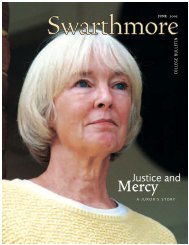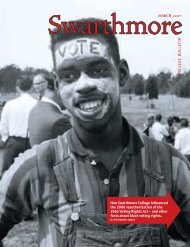moreans are taking another approach tohelping the impoverished. “If you look at alot of poor areas, you see that often they’renot served by supermarkets with fresh,nutritional food,” David Adler, communicationscoordinator for The Food Trust, said.The organization, founded in 1992, hasraised $80 million in public and privatefunds to lure supermarkets to underservedareas, bring nutrition education to schools,and run farmers markets, among other projects.So far, it has funded 11 supermarkets.“We’re helping them with start-up costs,which can be prohibitively expensive, especiallyin cities like Philadelphia,” Adler said.“But we’re not subsidizing them on a longtermbasis. The whole point is that this is aviable business opportunity that can bringjobs to areas that need them.” Recently, TheFood Trust released a report demonstratingthat in Philadelphia alone, poor neighborhoodswere losing $205 million in foodretaildemand because they lacked supermarkets.And, by stressing job creation aswell as public health concerns, the grouphas garnered support from across the politicalspectrum as well as acknowledgementfrom Harvard’s John F. Kennedy School ofGovernment as one of the country’s top 50innovative public-sector programs.When African American students occupiedSwarthmore’s Admissions Office in 1969 todemand that the College admit more blackstudents, they were echoing protests thathad erupted on campuses throughout thecountry. A year earlier, students had takenover several Columbia University buildings,decrying the university’s complicity in theAmerican war effort in <strong>Vietnam</strong> and thetakeover of a Harlem neighborhood gym toserve the needs of its overwhelmingly whitestudent body. For student activists, universityadministrations were part of the establishment—foesnot allies.To a certain extent, this remains the casetoday, especially with the living wage andunionization campaigns unfolding on thenation’s campuses. Likewise, Swarthmore’sLiving Wage and Democracy Campaign triedto pit students, faculty, and staff against theCollege’s administration. “We were in contactwith administrators early on and madeour pitch to President [Alfred H.] Bloom inspring 2000,” Sam Blair ’02, one of thecampaign’s student organizers, said. “Wegot an audience but no commitments thatanything would be done.” The campaigngathered momentum, with petitions, articlesin The Phoenix, rallies, and a brief demonstrationat a Board of Managers meeting.Finally, in December 2004, the Boardapproved President Bloom’s staff compensationplan—carefully crafted during 2 yearsof campuswide study and discussion andendorsed by all constituencies. Swarthmore’slowest hourly wage was pegged at$10.38 an hour, and a subsidy was created tomake family health care more affordable forThe problem: Lack of supermarketsin low-income urbanareas leads to scarcity ofnutritious, fresh food.The solution: Work withstore owners and encouragesupermarket chains to opennew stores.Food Trust activists Lisandra Lamboy ’03(left), James Piett ’03 (center), and DavidAdler ’00 (right) have been working withstore owner Juan Carlos Romano (rear) toimprove the quality and variety of freshfoods in his North Philadelphia store.38 : swarthmore college bulletin
the lowest-paid staff members.As far as living-wage campaigns go,Swarthmore saw much less student-administrationacrimony than the campaign Bartleyled at Harvard. “The Harvard board wascompletely secretive, with no schedule for itsmeetings, no public minutes,” Bartley said.“They had a complete disdain for what wewere trying to do.” Harvard President NeilRudenstine repeatedly refused to meet withcampaign leaders. Ultimately, Bartley andother students occupied Harvard’s administrationbuilding for 30 days, leaving onlywhen the university agreed to create a jointcommittee to recommend wage changes.“I was very sympathetic from the beginningto ensuring adequate compensation forour staff,” President Bloom said in a recentinterview. “We appointed a committee tostudy and recommend the level of wagesand benefits that would meet minumumneeds in our region. I was also mindful ofthe budgetary implications for the CollegePHOTOGRAPHS BY ELEFTHERIOS KOSTANSand the impact of a higher minimum wageon staff members who would not share inthat benefit.” Although the changes didn’tcome as soon as campaign organizers wouldhave liked, Bloom said it was important tofind a solution that the College could affordand that the broader community thoughtwas right.Blair maintains that the administration“over-intellectualized a problem that had apretty basic solution.” But despite the disagreements,the student-administrationrelationship during the campaign was “prettycordial,” Vice President for College andCommunity Relations and Executive Assistantto the President Maurice Eldridge ’61said.These days, “pretty cordial” is about asbad as student-administration relations getin terms of student activism. Responding toa student petition to sever Swarthmore’srelationship with Coca-Cola, citing allegedanti-union violence in Colombia, the Collegevoted its Coke shares in favor of ashareholder resolution, calling for an independentinvestigation into the allegations.And this year, it pulled the company’s bottledproducts from its snack bars. The Collegehas left open the question of whether itwill renew its Coca-Cola contract forSharples Dining Hall, when it ends in 2007.“We seek ways in which the College canresponsibly support student initiativesaimed at a better world—so that the institutioncan become their best ally,” said Bloom.Hanis of GI-Net said the College’s supportwas instrumental in the organization’s earlydays. “The President’s Office gave us somegrant money, got us a free phone line, andarranged for a basement office in the LangCenter for Civic and Social Responsibility.”Created in 2001 by an endowment establishedby Eugene Lang ’38, the Lang Centeris the latest tenant of the Swarthmore trainstation. From its perch between the campusand the larger community, it offers studentand community activists office and meetingspace as well as staff support for their work.Financial support also comes from LangOpportunity Scholarships of $10,000each. Recent recipients include Sa’ed Atshan’06, who founded the Palestinian StudentSociety of America. The group’s inauguralconference was held at Swarthmore thisspring.Another recipient, Bernadette Baird-Zars, started a language bank, enlisting 300student, staff, faculty, and alumni volunteersto provide translation services for asylumseekers and refugees. The organization covers38 languages. Its latest project, in conjunctionwith the Department of Justice, isrecording “Know Your Rights” presentationsto be made available at six detentioncenters around the country. “So, the immigrationdetainees will hear the voices ofSwarthmore students speaking Mandarinand Hindi and nine other languages,”Baird-Zars said.Today’s activists, to a degree much greaterthan their predecessors, say encouragementfrom faculty, staff, and administration havehelped them in their work. In contrast,1960s activists’ relationships with their liberalelders were strained.“Unlike the current generation ofactivists, we were building on very little—there wasn’t a foundation,” said Paul Booth,a former SDS leader who, today, is the executiveassistant to the president of the AmericanFederation of State, County, andMunicipal Employees. “We had some facultyencouragement but not much.”Now, many on Swarthmore’s faculty areBooth’s contemporaries, and current studentactivists cite professors as among theirbiggest supporters. Likewise, many administratorssaw the social conflagrations of the1960s up close from the students’ side.President Bloom, for example, was studyingin Paris in 1968, when student strikes led toa near revolution.Today’s activists have studied the successesand failures of the previous generation.“They’ve studied the successes of theearly civil rights movement and the bettermoments of the labor movement,” saidChristine Kelly, who teaches political scienceat William Paterson University. “They aren’treally caught up in that whole media imageof the 1960s and what it says about how anactivist should be.”Aaron Bartley agrees. “We grew up withan image of the 1960s,” he said. “It seemedlike a fairy tale.” No longer, though. And notin necrotic Buffalo, which Bartley is hopingto resuscitate—one house at time. It is noplace for fairy tales. TPaul Wachter has written for Legal Affairs,Salon.com, The Nation, and other magazines.june 2006 : 39

















